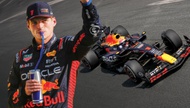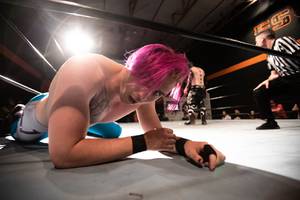Soccer players grooming themselves on the sidelines. Softball players fake-boffing in the dugout. Various exchanges of “Gurrrrl.” All things most people wouldn’t be surprised to see at a gay sporting event. And all scenes—infrequent as they were—from a recent Sin City Shootout, which brings its ninth tournament to Las Vegas January 14. Despite some attendees carrying themselves with the irreverence they enjoy at their favorite bar, they ultimately travel from all over the country to revel in the brotherhood and celebrate competition in a city built for celebration.
Touted as the largest annual LGBT sporting event anywhere, the Shootout has evolved into a five-day tournament and gathering for more than 8,500 athletes, though it’s not a quadrennial, Olympics-style event à la the Gay Games or OutGames. The schedule is heavy on softball—which solely comprised the inaugural 2008 edition—but has grown to include 23 other sports and games, from hockey and rock climbing to dodgeball, darts and bridge.
Yes, bridge. “It’s a type of mental sport,” tournament director Eric Ryan says. And its inclusion highlights the Shootout’s emphasis on participation over qualification, welcoming players of all skill levels and almost any game if someone is willing to organize it.
The Shootout is rooted in Ryan’s 20 years of visiting Las Vegas and 14 years of playing in gay softball leagues, a countrywide network that includes tens of thousands of players and dates back to the late ’70s, when it was vital for LGBT sports fans to find a safe environment for competition. After playing in several tournaments, Ryan created his own benefitting the Greater Los Angeles Softball Association. But instead of establishing it in his hometown, he looked north.
Forty teams participated in the 2008 launch, held on Martin Luther King Jr. Weekend at parks throughout the Valley, with off-Strip Tuscany Suites serving as the host hotel and Piranha one of the designated nighttime hangouts. Errors were not limited to the outfield.
“I made lots of mistakes,” Ryan says of that first year. “I didn’t even think of concessions and bathrooms.” Regardless, he saw enthusiastic reactions from players, who praised the tournament and the host city. “I spoke to managers and asked, ‘What do you think?’ They said, ‘We loved it; here’s some feedback.’ The draw was Las Vegas.”
Among them was Kevin Riddle, a player and coach in the Metro Nashville Softball Association. “I wouldn’t have visited Vegas otherwise, and I’m glad I did,” says Riddle, who has participated in every Shootout and travels farther for it than any of the 10 or so gay softball tournaments he attends every year.
The event stirred up hometown players, too. After meeting Ryan, members of the local LGBT community put the wheels in motion for what later became the Las Vegas Gay Softball League. It joined the 43-league North American Gay Amateur Athletic Alliance in January 2010, allowing Vegas-based teams into the Shootout.
Among those early local participants and LVGSL members was Neil Popish of the Las Vegas Grease Monkeys, C Division winners of the 2014 Gay Softball World Series. His continued Shootout participation can be chalked up to pride—not only is it a major tournament, it’s also in his backyard—and, despite the lack of Vegas-based administration, its local feel. Plus, it’s populated by some very talented athletes.
“It’s pretty competitive,” Popish says. “I got two of my best friends who are straight to join my team. When both came to the Shootout on separate occasions, they were blown away by the competition. They said, ‘I didn’t expect the players to be this good.’”
*****
The Shootout evolved slowly and naturally. The 2009 edition saw more teams (and actual concessions), and as more signed up over the years the event’s footprint spread to every park system in the Valley—meaning locals could watch games for free. The nightlife program got more ambitious, building on designated nights at LGBT favorites like Piranha, Charlie’s and Share to opening and closing festivities at bigger party spots (this year’s tourney capper will be at Rain at the Palms). And growth enabled Ryan to upgrade to the Rio and then Planet Hollywood before he was taken in by the boutique allure of the Tropicana, now Shootout HQ. He even landed a sponsorship from the Las Vegas Convention and Visitors Authority.
Crucially, Ryan expanded the Shootout’s offerings beyond softball. “I have friends who play in other sporting leagues, and they always talked about the camaraderie the gay softball leagues enjoyed and they wanted that. I asked them, ‘Why don’t you have your tournaments alongside the Sin City Shootout? People will get cheaper hotel rates, and there will be better buying power with all of us together.’”
A few years in, soccer and basketball joined the fray. Tennis followed in 2013 after it was pitched to Jim Lash, co-owner of the Las Vegas Gay Tennis Club (who met his husband at a San Diego tennis tournament 15 years ago). Lash was excited to use his experience as a local and as a travel agent to help those traveling for the Shootout, and to connect with non-racqueted players. “It’s nice to meet athletes in other sports.”
That same year, Ryan asked Chris Lorefice, chair of the international Wrestlers WithOut Borders, to head up a wrestling/grappling component. Lorefice signed on, particularly enticed by how the Shootout allowed anyone to take part. “We don’t run it like it’s a qualifying event for the Olympics,” he says. “We pair people by weight, age and skill level so it’s safe.”
Safety concerns are deeply rooted in the Shootout and LGBT sports organizations in general. Despite increasing social acceptance, gay athletes claim rude remarks and other forms of harassment still surface around mainstream leagues. “If a player has a stereotypical gay lisp or appearance, they might get mocked or teased playing in a non-LGBT league,” Ryan says. “In our league, they’re accepted. They’re part of the community.”
Being a gay event, the Shootout does attract some attendees who treat its evening festivities like a sports-themed circuit party; Ryan says not only have teams and players occasionally failed to show up to morning games due to partying too hard, but he’s also heard stories about gay hookup app Grindr “overloading” at Tropicana the past few years. (He balances one libertine aspect of the Shootout with social responsibility, as proceeds from sales of $10 tournament mugs go to local charities.)
Yet fun, especially in the name of sportsmanship, is the Shootout’s main selling point. The deeper reward, Lorefice says, is the bond. The commonalities and fraternization between players that make this competition actually serve to unite them.
SIN CITY SHOOTOUT January 14-18; full schedule at sincityshootout.com.







